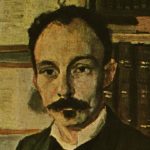Podcast: Play in new window | Download (Duration: 57:59 — 41.6MB)
Today on Interchange we confront the insidious myth of individualism with a contrasting scientific doctrine of interconnectedness.
Much like the male brain and thoughts of sex, in the USA hardly a moment goes by without some commercial or institutional message encouraging us to “follow our dreams” and be true to ourselves. And it’s assumed we act on “our own” when we follow our dreams just because they are ours. Some call it “the bourgeois myth of self-origination”, the idea that we ourselves cause our desires.

In 1882, José Martí, Cuban Revolutionary Leader and Poet, singled out the prevalent idea that “there could be no theme better, more stimulating or conducive to depth and grandeur than the study of oneself”. That idea remains ascendant. It is a tenet of this culture that expressing who you are is the ultimate right and freedom; and we can now adapt Descartes’s Western European proof of existence — I think therefore I am — to, I tweet therefore I am…or more desperately, I am followed on Twitter therefore I am.
And what about the insistence upon choice as another pillar of freedom and a foundation for happiness–the more choices we have, surely the happier we’ll be, especially if there are no constraints on how or what we can choose. This is described a “negative liberty”–or freedom from interference and imposition. Look to yourself, know your heart, listen to your inner voice, and go your own way…
To José Martí such liberty is false, believing that it undermines knowledge and understanding: that someone who looks inside themselves for the grounds of personal freedom risks delusion. Such a person, believing the “myth of the self-made man”, is like “an oyster in its shell, seeing only the prison that traps him and believing, in the darkness, that it is the world”.
A philosopher of interdependence and connections he knew the truth of Whitman’s great declaration that each of us contains multitudes; And he knew too the false promise of success tied to material gain, what Simon Bolivar called the misery of liberty.
José Martí, who would die in the Cuban Revolution against Spain at the age of 42, believed that knowledge and understanding is a collective construction and that ideas do not originate within us, but come to us through our cultural institutions–like the family, churches and schools, and also laws–and that what is expressed when you “express yourself” is this collective mind.
If your culture is imperial, slave-holding, and expansionist, what kind of self will you express?
GUEST
 Susan Babbitt is an associate professor of philosophy at Queen’s University, Kingston, Canada, author of Humanism and Embodiment: From Cause and Effect to Secularism, and most recently of José Martí, Ernesto “Che” Guevara and Global Development Ethics. She’s also a frequent contributor to Counterpunch.
Susan Babbitt is an associate professor of philosophy at Queen’s University, Kingston, Canada, author of Humanism and Embodiment: From Cause and Effect to Secularism, and most recently of José Martí, Ernesto “Che” Guevara and Global Development Ethics. She’s also a frequent contributor to Counterpunch.
RELATED
Our America by José Martí
Montecristi Manifesto by José Martí and Máximo Gómez (1895)
José Martí in History and Art – The Bronx Museum of the Arts
Articles in Counterpunch by Susan Babbitt
Don’t Raise Liberalism From the Dead (If It is Dead, Which It’s Not)
Cuba’s “Battle for Ideas” Affects Us All, or Could, and Should
Invisible in Life, Invisible in Death: How Information Becomes Useless
MUSIC
 Songs by Pablo Milanés from Versos Sencillos De José Martí (1973)
Songs by Pablo Milanés from Versos Sencillos De José Martí (1973)
“Yo Soy Hombre Sincero”
“Vierte Corazon Tu Pena”
“Banquete de Tiranos”
“Mi Verso Es Como un Puñal”
“Amor de Ciudad Grande”
CREDITS
Producer & Host: Doug Storm
Assistant Producer: Rob Schoon
Studio Engineer: Bryce Martin
Executive Producer: Wes Martin
 WFHB Bloomington Community Radio
WFHB Bloomington Community Radio


